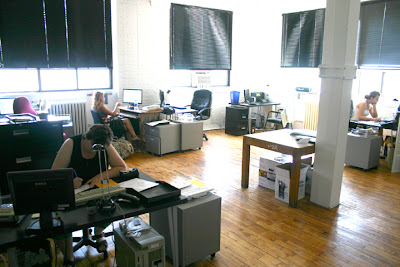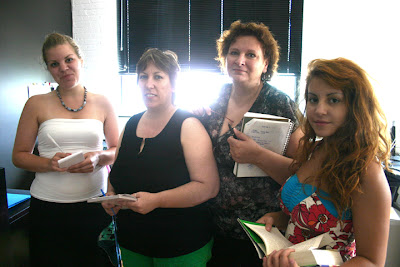1) What the fuck is going on?
We ask ourselves this on a daily (actually, hourly) basis. We love our clients and we love the work we do – but it is demanding and everyone wants something right now, damn it. Can’t they bloody well wait?
2) What is STAF?
The party line – at least, the thing we write on our own grant applications – is that “STAF is a non-profit arts service organisation funded by the OAC, TAC and CCA, with a mandate to provide a variety of subsidised administration services to the independent theatre community.”
STAF stands for the archaic-sounding “Small Theatre Administration Facility” and we’ve been around since 1992. We have a Board (Buddies’ Jim LeFrançois, LKTYP’s Craig Morash, Cahoots’ Jovanni Sy, Nightwood’s Kelly Thornton and Threshold’s Mark Cassidy) and four staff as well as a few people on contract, as needed.
 3) Do you feel that STAF is currently living up to the spirit of its mandate?
3) Do you feel that STAF is currently living up to the spirit of its mandate?
Yes. Apart from the over 60 clients who came through the door last year wanting anything from grant writing to bookkeeping and marketing services, we’ve also launched some new initiatives that are beyond the regular admin stuff, such as grant writing workshops and a low-cost flyer and poster distribution service.
Our newest project is a professional development program that launches in September ’07 for indie theatre artists called The Reality Check Series. We will be running workshops such as Who’s your daddy? (about sponsorships), Who are you people and what have you done with my theatre company? (about Boards), The devil has your soul and you’re lost in Internet translation (about marketing) and Masters of the universe: fact or fiction? (about agents and accountants).
 4) Why are there so many artists yet so few administrators in Toronto’s independent theatre community?
4) Why are there so many artists yet so few administrators in Toronto’s independent theatre community?
It’s such a multi-layered problem, from a lack of funding to a lack of admin internship and professional development opportunities. Indie artists can just about squeeze enough money out of the granting agencies to pay for the actors, venue rentals and production materials – they really can’t afford to pay for administrators. And let’s face it, administration is not that glamorous. It is hard work and we are really underpaid and the accolades are not that frequent.
So, what is STAF doing about this? Well, a little knowledge is not a dangerous thing in administration and so running professional development workshops will help, I hope. And we also provide intern opportunities – as of September, we will have three on the go.
5) What advice would you give a small independent theatre company looking to solidify and optimize its organizational structure?
There are many different kinds of operating models and the small independent theatre company (regardless of if it is registered non-profit, a collective or an ad hoc) has to have an infrastructure in place that allows the artists to do the artistic work and not too much of the admin. The real unsung heroes here are the indie artists who are doing their own administration, often without remuneration.
For instance, the kind of infrastructure that Theatre Smith-Gilmour (TSG) has is very different than the kind of infrastructure that Sky Gilbert has. Both are STAF clients but their level of artistic activity drives the infrastructure STAF provides for them. We do everything for TSG and the company also does international touring and so they have an international touring agent. For Sky, we only do grant writing, Equity contracts and marketing, which is fine as he only produces one main stage a show a year. TSG is a registered charity and so we do the bookkeeping. Sky is not a registered charity and so he can work on spreadsheets.
I also advise the small independent theatre company to stay away from highly structured and formal Boards – indie artists don’t need them and they just end up having an additional infrastructure that they have to support and answer to. They should surround themselves with supporters: people who love the work, who can bring people to the shows, who can help get tons of in-kind. Call them a Board if you want.
As long as things are well planned, well organised and the artists can remain accountable to their granting partners and supporters, then a small independent theatre company has the legs it needs to fulfill its artistic mandate.
 6) What’s the minimum accounting infrastructure you would recommend for a smaller independent theatre company?
6) What’s the minimum accounting infrastructure you would recommend for a smaller independent theatre company?
Purchasing QuickBooks or Simply Accounting is not really necessary. Spreadsheets are Gods for the indie theatre artist: for budgets, bank deposits and cheque-writing records, and organising petty cash. We have a plethora of templates at STAF that we are always willing to send to indie theatre artists.
7) What are some of the common mistakes you see on grant applications?
Not getting organised well ahead of time, which is important, given that with most indie theatre companies, everyone is writing a separate section of the grant.
Some theatre artists are so dazzled by their own prose that their writing is totally incomprehensible. The late broadcaster Peter Gzowski said, “When writing, throw away your darlings,” which means don’t get caught up in catchy turns of phrasing that make sense to the writer but not the reader. The Selection Committees have well over 100 applications to read, so your application has to be clear and concise and in order, according to the guidelines. And there’s no such thing as entitlement – no one “deserves” to get a grant. If there is an inkling of entitlement in a grant application, it will piss off the Selection Committee in a very big way.
The Theatre Officer is your friend. They are your advocates at the committee level. They do not make the decision, but can nudge the committee along. So, call the OAC and TAC Theatre Officers well before the grant deadline and arrange to meet to chat about your project. The CCA is a bit more difficult as everyone is responsible for project grants, but contact someone in the Theatre Section to get advice: Bob Allen is older than dirt but he knows the CCA jury system inside out, and Lorne Pardy is open and easy to talk to.
Not understanding the selection process is another. For instance, project funding is mostly granted on artistic merit, so sending in an application without a director’s statement and casting are going to loose big points. I did a grant review last week and among the many problems with the grant application, the director and actors had not been decided upon. Strangely, the company thought that this was OK and that their play selection mandate was good enough.
Writing a grant is not as daunting as it first seems . . . and attending the all-day STAF grant writing workshop helps!
 8) What can theatre makers do to further stretch their marketing and PR spend?
8) What can theatre makers do to further stretch their marketing and PR spend?
Building audiences is all about building relationships, so keeping a good database is important. Don’t only “talk” to them if you want them to buy a ticket. Keep them informed as to what you are doing year round. So, doing great e-blasts is very much OK as long as it doesn’t become intrusive.
NOW and eye weekly love to do media sponsorships and will up the buy, which allows for the advertising dollar to be stretched.
Don’t pester the press. A good clear press release goes a long way to being well received. Words like “unique” and “exceptional” and “creative” don’t cut it anymore – people like Jon Kaplan have been doing this stuff for years and know when a press release is full of shit.
9) How would you characterize the relationship between actors’ unions and theatre companies in Toronto?
It’s a difficult one and the relationship with Equity can be contentious at times, but there are some good officers who really know their stuff. Collective bargaining and protecting workers is of course important, but if the arts were funded to a degree that artists could earn a living wage, maybe unions would not be needed. But that’s a big pipe dream and certainly not a reality in this current political climate.
10) When you look at the varied landscape of Toronto’s independent theatre community, what are you most optimistic about?
I have a huge admiration for independent theatre artists who take a risk and put themselves out there. The community is extraordinary active and there is some remarkable work being done, especially the site-specific work. Given the lack of affordable space at the moment, we’ll probably see more, which is good as it breaks down barriers which leads to dialogue. There’s nothing better than a bit of glasnost to keep a community vibrant and healthy!


STAF was awful helpful when we put together our production of The Master and Margarita last year.
Weren’t we just lamenting a lack of indie theatre producers on the blog a little while ago? They have a bunch people who can do a lot of that stuff on a contract basis at affordable rates.
Guess we need a new lament. Shit, we’ve covered critics and the unions too….Guess it’s a 3 way tie between the weather, politicians and trans-fats.
The “Reality Check Series” sounds awesome!
“Who are you people and what have you done with my theatre company? (about Boards)” – is possibly the best and funniest seminar name of all time.
Thanks for all the info and insight Frances!